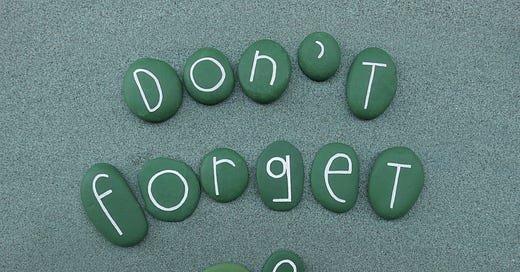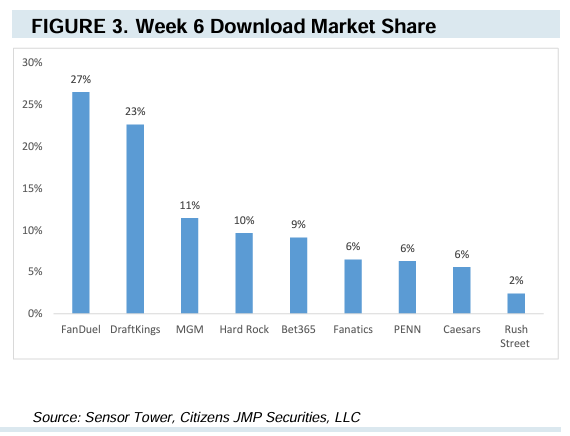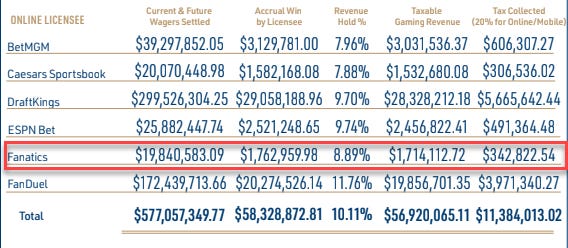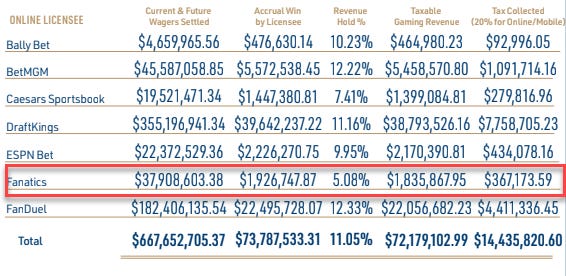Don't You Forget About Me
Bet365 isn't the only sports betting challenger brand making waves in US markets; Fanatics has quietly crept into third place in New York.
The Bulletin Board
NEWS: Fanatics is making its presence felt in New York.
LOOSE ENDS: DraftKings launches Electric Poker in Pennsylvania and two iCasino legalization quotes.
NEWS: Election betting’s legal victories are not the final word on the matter.
VIEWS: California Tribes aren’t playing around with sweepstakes.
AROUND the WATERCOOLER: Recommended reading.
STRAY THOUGHTS: The NBA is still pushing for federal oversight.
SPONSOR’S MESSAGE - Sporttrade was borne out of the belief that the golden age of sports betting has yet to come. Combining proprietary technology, thoughtful design, and capital markets expertise, our platform endeavors to modernize sports betting for a more equitable, responsible, and accessible future.
“Sporttrade is now live in Arizona on Android and iOS!”
Fanatics Coming on Strong in New York
ESPN Bet’s New York debut (covered yesterday) overshadows Fanatics’ rise in the Empire State; according to the New York State Gaming Commission’s most recent sports betting reports, Fanatics was in third place in weekly handle.
FanDuel: $184.1 million
DraftKings: $182.4 million
Fanatics: $43 million
Caesars: $32.2 million
BetMGM: $32.2 million
BetRivers: $9.4 million
ESPN Bet: $9.1 million
Bally Bet: $2.2 million
Resorts World: $1.6 million
In fact, all four of the challenger brands STTP is watching (including ESPN Bet) are outperforming Caesars in app downloads, per the JMP Securities team, with assistance from Sensor Tower:
And it’s not just New York. Fanatics is also gaining steam in Massachusetts, where it ranks fourth behind DraftKings and FanDuel and is nipping on the heels of BetMGM for third place.
That’s a significant shift from just a few months prior. In May, Fanatics was dead last in the six-sportsbook market.
Here is a look at the most recent numbers from September, showing Fanatics passing Caesars and ESPN Bet in the now seven-sportsbook market:
Loose Ends: DraftKings Launches Electric Poker in PA and Two iCasino Quotes
DraftKings launches Electric Poker in Pennsylvania: Earlier this week, it was announced that Pennsylvania had begun the process of joining the Multi-State Internet Gaming Agreement (MSIGA). Since then, we’ve learned that DraftKings has launched its recently debuted Electric Poker game in PA. “After positive feedback from our players in Michigan, we are thrilled to expand our Electric Poker offerings to our customers in Pennsylvania, delivering them a best-in-class online poker experience,” Jason March, Vice President of iGaming Marketing and Operations at DraftKings, said.
Quote of the Week: “The RG piece is probably, in my mind, the most critical piece to being able to advance this industry. I think that some of the false narratives of cannibalization and job loss … can be overcome with the taxes.” ~ Fanatics VP of Government Affairs Brandt Iden
Quote of the Week runner-up: “US online casino expansion has been hard, and it’s getting a lot, lot harder. Key stakeholders, including online sports-betting operators, land-based casinos, and labor unions, remain bitterly divided over whether online casino eats into land-based casino revenue.” ~ Chris Krafcik, Managing Director at Eilers & Krejcik Gaming
SPONSOR’S MESSAGE - Highest approvals. Zero chargebacks. No trade-offs.
Aeropay's bank transfers deliver industry-leading net profits without compromising security or conversion rates. 95% of Aeropay transactions are approved, allowing more players and higher customer satisfaction rates.
Aeropay reduced fraudulent transactions during the NFL season by nearly 400%.
With its bank-driven approach to secure and efficient money movement, Aeropay is the smart choice for businesses.
Ready to elevate your payment experience? Book a Demo
Is Election Betting Here to Stay?
Some terrific analysis from Behnam Dayanim at Orrick on the election betting situation in the US (the analysis was written before the Appeals Court decision to deny the CFTC’s motion to stay) indicates we haven’t seen the end of the election betting debate:
“The DC federal district court’s decision rejecting the CFTC’s attempt to prohibit Kalshi from offering event contracts involving political events will not be the last word on the matter.”
As Dayanim notes, even if the court sides with Kalshi, the litigation could prove to be a side-show, as the expected rule changes from the CFTC would begin the legal challenge process all over again:
“The Commission has proposed a new regulation that would prohibit event contracts involving political events by finding that activity to be “similar” to gaming and categorically contrary to the public interest.”
“Not inconsequentially, the proposed rule also would prohibit contracts involving sports betting. The Sports Betting Alliance and others have opposed that latter change, instead advocating for the CFTC to preserve the flexibility to permit these contracts in order to enable licensed sportsbooks to hedge their economic risks. Nothing in Judge Cobb’s decision is helpful to that position, as neither Kalshi nor the CFTC argued that the current “special rule” does not encompass sports betting.”
My question concerns toothpaste and tubes. Kalshi and others currently offer election betting markets and will continue to do so during and after the 2024 elections.
That toothpaste will be hard to put back in the tube (considering Kalshi is offering dozens of election betting markets), and my guess is that the apocalyptic attitude toward these markets will prove as prophetic as the Millerite movement.
IGA New Normal Webinar Series Tackles Sweepstakes
After throwing down the gauntlet against sweepstakes operators during G2E, The Indian Gaming Asscositations New Normal webinar hosts Victor Rocha and Jason Giles were joined by CNIGA Chairman James Siva to discuss sweepstakes and daily fantasy sports in California.
Comments were turned off for the session because, as Victor Rocha said, “I want to drive all the people in sweepstakes and DFS crazy.”
Rocha, who was more animated about this topic than I’ve seen him since the online poker fights of a decade ago, explained how he reached his breaking point with sweepstakes, pointing out that in 2022, there was an attempted sports betting invasion by DraftKings and FanDuel. In 2024, there was an “I don’t know what that was” attempt to legalize sports betting. And now, Rocha said, we have this: sweepstakes.
Rocha divided the sweepstakes crowd into two groups: people he knows/likes/respects and “vampires” and “bottom-feeders,” people who show up whenever a new product begins to gain momentum to suck the blood out of the industry or pedal their next grift. Throughout the webinar, Rocha hammered home the point that “they’re unregulated and untaxed.”
“They’re mocking us to our face… this is gambling on training wheels,” Rocha said. He called sweepstakes an “existential threat,” warning that sweepstakes sites are hiding behind lawyers and using the DFS model to “takeover” online gambling before it’s legal.
According to Rocha (paraphrasing), “They plan to park in California and, when it’s legal, come in with their database.” Rocha added that anyone involved in these activities now should be put in the penalty box when California legalizes online gambling.
Rocha said sweepstakes sites and DFS 2.0 operators have reached out, but he called the gesture too late as the transgression has already been committed. "They’re already here taking money.” What Rocha said he heard at G2E was, “If you can stop us, go ahead and stop us.”
Siva said CNIGA has sent letters to the California Attorney General and intends to send letters to companies like Google and Apple requesting they remove the apps from their stores.
Siva also said (paraphrasing) that any entry into gaming in California starts and ends with the tribes. You don’t have to like it, but you have to respect it.
Giles said that “maybe the SAFE Bet Act isn’t optional,” hinting that tribes may support federal gambling oversight.
According to Rocha, this was the first in a five-part series on sweepstakes, with forthcoming talks involving the AGA, Jeremy Kudon of the Sports Betting Alliance, and others.
SPONSOR’S MESSAGE - SUBSCRIBE NOW to Zero Latency, the new podcast from Eilers & Krejcik Gaming that provides unparalleled insight into the U.S. online gambling industry through interviews with industry insiders and analysis from EKG experts.
Around the Watercooler
Social media conversations, rumors, and gossip.
I recommend subscribing to the How Gambling Works Substack by Isaac Rose-Berman. The newsletter is perspective-based commentary, and while I don’t agree with all the conclusions, it has given me plenty of thoughts to mull over, like this excerpt from his recent post, In Defense of Sports Betting:
There is a lot more media coverage on the downsides of sports betting than iGaming. Much of this is due to visibility: sports gambling is more widespread, and it’s impossible to miss the ads if you watch sports or consume any sports-related media. Some of the panic likely comes from the belief that sports betting can serve as a gateway drug to other forms of gambling, or that it’s more dangerous than iGaming, especially for kids, because there’s an illusion of control—if you know sports, you might think you have an edge when you don’t, and bet more than you should.
But a lot of the criticism stems from the belief that legal sports betting is uniquely positioned to steal Americans’ hard-earned money. And that’s wrong.
Legal iGaming poses a far greater threat to Americans’ financial security, and unlike sports betting it hasn’t already become mainstream. From a cultural and policy standpoint, it’s a lot easier to push back against something that isn’t yet legal—or culturally normalized—in most of the country than to try and criminalize what’s already ubiquitous.
As one gambling lobbyist (who asked to remain anonymous) told me, “Even if you think sports betting is as bad as [online] casino, which it’s not, that debate is basically settled… If the concern is addiction and helping Americans lose less, time and money spent fighting against iGaming is probably ten times more effective than trying to make [sports] betting illegal again.”
Whether you agree or not, this is a genuine, not uncommon opinion about different forms of gambling.
Stray Thoughts
If you want to know why I don’t discount federal action like the SAFE Bet Act, it’s because of statements like the one made during yesterday’s webinar (covered above) by the IGA’s Jason Giles and the following from the NBA.
In an interview with the Associated Press, NBA Commissioner Adam Silver said he doesn’t regret his 2014 op-ed supporting the legalization of sports betting. Still, he also intimated that he’s not overly impressed with the current state of things.
"I was in favor of a federal framework for sports betting. I still am," Silver recently told the AP. "I still think that the hodgepodge of state by state makes it more difficult for the league to administer it.”
Silver’s comments echo those of NBA deputy commissioner and COO Mark Tatum, who said in June: “We’ve always been, again, an advocate for a federal regulatory framework here. I think it creates transparency that we didn’t have previously, which allows us to maintain the integrity of the sport, which is essential to all sports leagues.”
These are politically influential groups that can move the proverbial needle.









